Deck 5: Tissues
Question
Question
Question
Question
Question
Question
Question
Question
Question
Question
Question
Question
Question
Question
Question
Question
Question
Question
Question
Question
Question
Question
Question
Question
Question
Question
Question
Question
Question
Question
Question
Question
Question
Question
Question
Question
Question
Question
Question
Question
Question
Question
Question
Question
Question
Question
Question
Question
Question
Question
Question
Question
Question
Question

Unlock Deck
Sign up to unlock the cards in this deck!
Unlock Deck
Unlock Deck
1/54
Play
Full screen (f)
Deck 5: Tissues
1
What is the name of the tissue where you would find this? 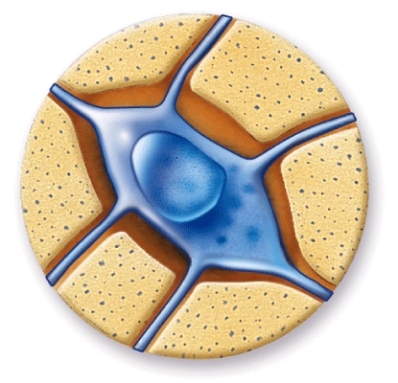
A) Bone
B) Hyaline cartilage
C) Skeletal muscle
D) Nervous

A) Bone
B) Hyaline cartilage
C) Skeletal muscle
D) Nervous
A
2
Which of the following is the name of B? 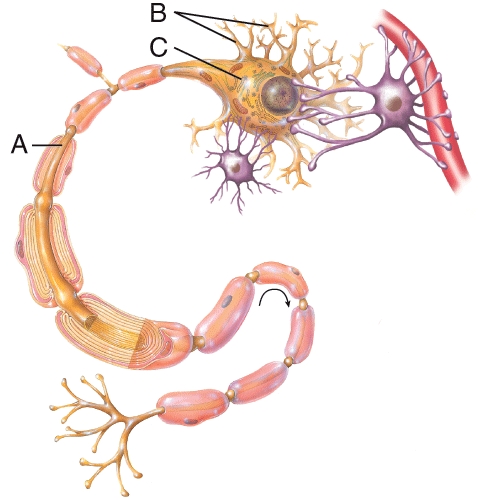
A) Axon
B) Dendrites
C) Cell body
D) Neuroglia

A) Axon
B) Dendrites
C) Cell body
D) Neuroglia
B
3
What type of connective tissue is this? 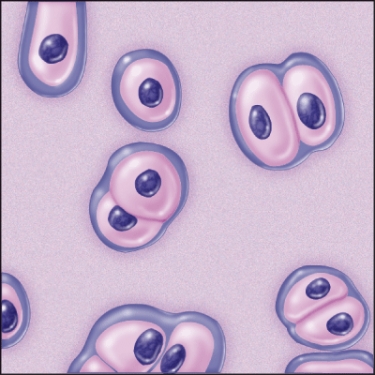
A) Elastic cartilage
B) Areolar connective tissue
C) Hyaline cartilage
D) Adipose tissue

A) Elastic cartilage
B) Areolar connective tissue
C) Hyaline cartilage
D) Adipose tissue
C
4
Where would you expect to find this tissue in the human body? 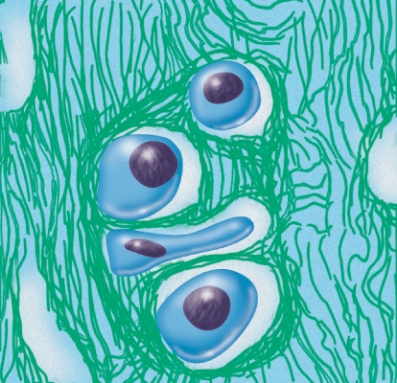
A) In the blood
B) Under the skin
C) In between vertebrae
D) Attached to bone

A) In the blood
B) Under the skin
C) In between vertebrae
D) Attached to bone

Unlock Deck
Unlock for access to all 54 flashcards in this deck.
Unlock Deck
k this deck
5
The fetal skeleton is composed of?
A) Elastic cartilage
B) Osteoid cartilage
C) Fibrocartilage
D) Hyaline cartilage
A) Elastic cartilage
B) Osteoid cartilage
C) Fibrocartilage
D) Hyaline cartilage

Unlock Deck
Unlock for access to all 54 flashcards in this deck.
Unlock Deck
k this deck
6
Which cells of nervous tissue are supporting cells?
A) Nerves
B) Neurons
C) Neuroglia
D) Axons
A) Nerves
B) Neurons
C) Neuroglia
D) Axons

Unlock Deck
Unlock for access to all 54 flashcards in this deck.
Unlock Deck
k this deck
7
Which tissue type lines the body's cavities?
A) Epithelial
B) Connective
C) Muscle
D) Nervous
A) Epithelial
B) Connective
C) Muscle
D) Nervous

Unlock Deck
Unlock for access to all 54 flashcards in this deck.
Unlock Deck
k this deck
8
What does part A of the neuron do? 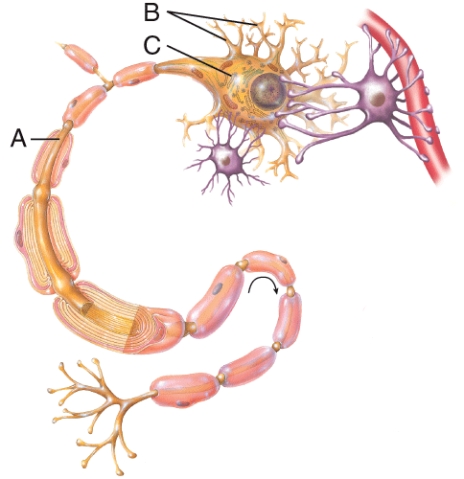
A) Transmits impulses
B) Contains the nucleus and other organelles
C) Receives impulses
D) Supports the neuron

A) Transmits impulses
B) Contains the nucleus and other organelles
C) Receives impulses
D) Supports the neuron

Unlock Deck
Unlock for access to all 54 flashcards in this deck.
Unlock Deck
k this deck
9
What component of connective tissue is designed for strength?
A) Fibroblasts
B) Elastin fibers
C) Chondrocytes
D) Collagen fibers
A) Fibroblasts
B) Elastin fibers
C) Chondrocytes
D) Collagen fibers

Unlock Deck
Unlock for access to all 54 flashcards in this deck.
Unlock Deck
k this deck
10
Small hair-like folds of the cell membrane that increase the cell's surface area for absorption are called?
A) Cilia
B) Blood
C) Microvilli
D) Flagella
A) Cilia
B) Blood
C) Microvilli
D) Flagella

Unlock Deck
Unlock for access to all 54 flashcards in this deck.
Unlock Deck
k this deck
11
What two words are used to classify epithelium in terms of the number of cell layers?
A) Simple and calcified
B) Simple and stratified
C) Cuboidal and simple
D) Cuboidal and columnar
A) Simple and calcified
B) Simple and stratified
C) Cuboidal and simple
D) Cuboidal and columnar

Unlock Deck
Unlock for access to all 54 flashcards in this deck.
Unlock Deck
k this deck
12
In which kind of tissue would you find this? 
A) Cardiac muscle
B) Smooth muscle
C) Skeletal muscle
D) Adipose tissue

A) Cardiac muscle
B) Smooth muscle
C) Skeletal muscle
D) Adipose tissue

Unlock Deck
Unlock for access to all 54 flashcards in this deck.
Unlock Deck
k this deck
13
Which connective tissue is responsible for cellulite "bumps" on the skin?
A) Blood
B) Adipose
C) Cartilage
D) Dense connective
A) Blood
B) Adipose
C) Cartilage
D) Dense connective

Unlock Deck
Unlock for access to all 54 flashcards in this deck.
Unlock Deck
k this deck
14
Where would you expect to find this connective tissue? 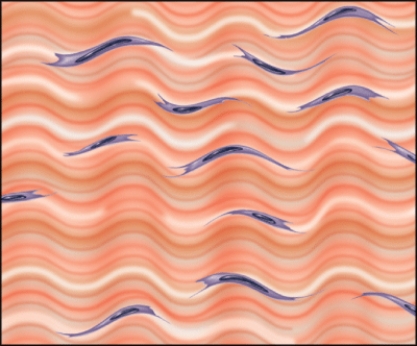
A) Lungs
B) Trachea
C) Bone
D) Knee joint

A) Lungs
B) Trachea
C) Bone
D) Knee joint

Unlock Deck
Unlock for access to all 54 flashcards in this deck.
Unlock Deck
k this deck
15
What is the name of this connective tissue? 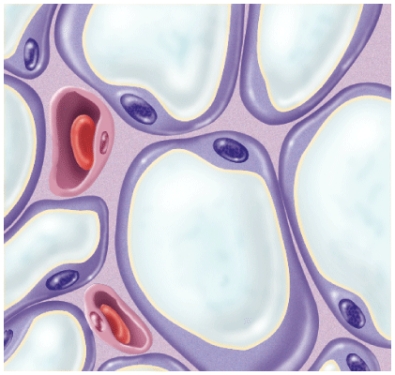
A) Adipose tissue
B) Bone tissue
C) Dense regular connective tissue
D) Smooth muscle

A) Adipose tissue
B) Bone tissue
C) Dense regular connective tissue
D) Smooth muscle

Unlock Deck
Unlock for access to all 54 flashcards in this deck.
Unlock Deck
k this deck
16
Bone tissue is unique because it is the:
A) only connective tissue that has collagen.
B) only calcified connective tissue.
C) only connective tissue found in vertebrates.
D) only dense connective tissue.
A) only connective tissue that has collagen.
B) only calcified connective tissue.
C) only connective tissue found in vertebrates.
D) only dense connective tissue.

Unlock Deck
Unlock for access to all 54 flashcards in this deck.
Unlock Deck
k this deck
17
What would this type of epithelium be called? 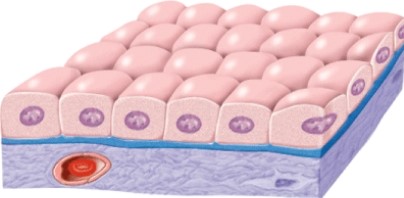
A) Simple cuboidal
B) Simple columnar
C) Simple squamous
D) Stratified squamous

A) Simple cuboidal
B) Simple columnar
C) Simple squamous
D) Stratified squamous

Unlock Deck
Unlock for access to all 54 flashcards in this deck.
Unlock Deck
k this deck
18
Which of the following is a disease that damages cartilage inside joints?
A) Osteoarthritis
B) Rheumatoid arthritis
C) Osteoporosis
D) Fibromyalgia
A) Osteoarthritis
B) Rheumatoid arthritis
C) Osteoporosis
D) Fibromyalgia

Unlock Deck
Unlock for access to all 54 flashcards in this deck.
Unlock Deck
k this deck
19
Where would you find this type of muscle fiber? 
A) Attached to bone
B) In the digestive tract
C) As part of the biceps brachii muscle
D) In the heart

A) Attached to bone
B) In the digestive tract
C) As part of the biceps brachii muscle
D) In the heart

Unlock Deck
Unlock for access to all 54 flashcards in this deck.
Unlock Deck
k this deck
20
What makes skeletal muscle different from other types of muscle tissue?
A) Number and position of nuclei
B) Involuntary
C) Branching
D) Gap junctions
A) Number and position of nuclei
B) Involuntary
C) Branching
D) Gap junctions

Unlock Deck
Unlock for access to all 54 flashcards in this deck.
Unlock Deck
k this deck
21
How many abdominopelvic regions are there?
A) 1
B) 2
C) 4
D) 9
A) 1
B) 2
C) 4
D) 9

Unlock Deck
Unlock for access to all 54 flashcards in this deck.
Unlock Deck
k this deck
22
The cells of connective tissue are held close together by strong cell-to-cell attachments.

Unlock Deck
Unlock for access to all 54 flashcards in this deck.
Unlock Deck
k this deck
23
What is the endocrine system's function?
A) Regulating growth and development
B) Movement and heat generation
C) Exchange of carbon dioxide and oxygen
D) Obtaining nutrients
A) Regulating growth and development
B) Movement and heat generation
C) Exchange of carbon dioxide and oxygen
D) Obtaining nutrients

Unlock Deck
Unlock for access to all 54 flashcards in this deck.
Unlock Deck
k this deck
24
In which cavity is the brain found?
A) Dorsal body cavity
B) Mediastinum
C) Ventral body cavity
D) Pericardial cavity
A) Dorsal body cavity
B) Mediastinum
C) Ventral body cavity
D) Pericardial cavity

Unlock Deck
Unlock for access to all 54 flashcards in this deck.
Unlock Deck
k this deck
25
The heart is located in the:
A) abdominal cavity.
B) thoracic cavity.
C) dorsal body cavity.
D) pelvic cavity.
A) abdominal cavity.
B) thoracic cavity.
C) dorsal body cavity.
D) pelvic cavity.

Unlock Deck
Unlock for access to all 54 flashcards in this deck.
Unlock Deck
k this deck
26
It is possible to use stem cells to "grow" body parts such as trachea for transplantation.

Unlock Deck
Unlock for access to all 54 flashcards in this deck.
Unlock Deck
k this deck
27
The forehead is __________ to the mouth.
A) proximal
B) distal
C) superior
D) inferior
A) proximal
B) distal
C) superior
D) inferior

Unlock Deck
Unlock for access to all 54 flashcards in this deck.
Unlock Deck
k this deck
28
Which kind of epithelial cell arrangement is best for quick movement across?
A) simple squamous
B) stratified squamous
C) simple cuboidal
D) columnar cuboidal
A) simple squamous
B) stratified squamous
C) simple cuboidal
D) columnar cuboidal

Unlock Deck
Unlock for access to all 54 flashcards in this deck.
Unlock Deck
k this deck
29
The brain, spinal cord, blood vessels and nerves comprise the nervous system.

Unlock Deck
Unlock for access to all 54 flashcards in this deck.
Unlock Deck
k this deck
30
Cartilage is vascular which means it has a rich blood supply.

Unlock Deck
Unlock for access to all 54 flashcards in this deck.
Unlock Deck
k this deck
31
The arm is ___________ to the forearm.
A) proximal
B) distal
C) superior
D) inferior
A) proximal
B) distal
C) superior
D) inferior

Unlock Deck
Unlock for access to all 54 flashcards in this deck.
Unlock Deck
k this deck
32
The groin is ____________ to the chest.
A) proximal
B) distal
C) superior
D) inferior
A) proximal
B) distal
C) superior
D) inferior

Unlock Deck
Unlock for access to all 54 flashcards in this deck.
Unlock Deck
k this deck
33
The heart is an example of a(n):
A) tissue.
B) organ.
C) cell.
D) organ system.
A) tissue.
B) organ.
C) cell.
D) organ system.

Unlock Deck
Unlock for access to all 54 flashcards in this deck.
Unlock Deck
k this deck
34
Which of the following organ systems is involved in immunity?
A) Skeletal
B) Lymphatic
C) Respiratory
D) Muscular
A) Skeletal
B) Lymphatic
C) Respiratory
D) Muscular

Unlock Deck
Unlock for access to all 54 flashcards in this deck.
Unlock Deck
k this deck
35
The matrix of connective tissue can be liquid, gel-like or solid.

Unlock Deck
Unlock for access to all 54 flashcards in this deck.
Unlock Deck
k this deck
36
Describe the view of this body. 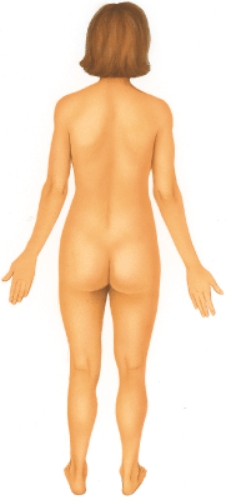
A) Ventral
B) Dorsal
C) Lateral
D) Medial

A) Ventral
B) Dorsal
C) Lateral
D) Medial

Unlock Deck
Unlock for access to all 54 flashcards in this deck.
Unlock Deck
k this deck
37
The foot is on the _____________ part of the lower limb.
A) proximal
B) distal
C) superior
D) inferior
A) proximal
B) distal
C) superior
D) inferior

Unlock Deck
Unlock for access to all 54 flashcards in this deck.
Unlock Deck
k this deck
38
Salivary glands are exocrine glands.

Unlock Deck
Unlock for access to all 54 flashcards in this deck.
Unlock Deck
k this deck
39
Smooth muscle lines hollow organs like blood vessels and the digestive tract.

Unlock Deck
Unlock for access to all 54 flashcards in this deck.
Unlock Deck
k this deck
40
When you lose fluids by sweating and urinating, which system will work to replenish the water?
A) Respiratory
B) Urinary
C) Digestive
D) Cardiovascular
A) Respiratory
B) Urinary
C) Digestive
D) Cardiovascular

Unlock Deck
Unlock for access to all 54 flashcards in this deck.
Unlock Deck
k this deck
41
All 11 organ systems combined make up a(n) ______________.

Unlock Deck
Unlock for access to all 54 flashcards in this deck.
Unlock Deck
k this deck
42
Compare and contrast the structure and function of the three muscle types.

Unlock Deck
Unlock for access to all 54 flashcards in this deck.
Unlock Deck
k this deck
43
The urinary and reproductive organs are mostly housed within the pelvic cavity.

Unlock Deck
Unlock for access to all 54 flashcards in this deck.
Unlock Deck
k this deck
44
The four tissue types join together in specific proportions and patterns to form _____________.

Unlock Deck
Unlock for access to all 54 flashcards in this deck.
Unlock Deck
k this deck
45
The three parts of a neuron are dendrites, axons and ____________ .

Unlock Deck
Unlock for access to all 54 flashcards in this deck.
Unlock Deck
k this deck
46
An epithelial tissue that is composed of one layer of flat cells would be called simple ___________.

Unlock Deck
Unlock for access to all 54 flashcards in this deck.
Unlock Deck
k this deck
47
In the 'anatomical position', the person is standing up straight with the arms at their side hanging naturally.

Unlock Deck
Unlock for access to all 54 flashcards in this deck.
Unlock Deck
k this deck
48
Cardiac muscle cells differ from other muscle in part because they communicate through junctions called _____________.

Unlock Deck
Unlock for access to all 54 flashcards in this deck.
Unlock Deck
k this deck
49
The cavity indicated by the letter A in the diagram is the thoracic cavity. 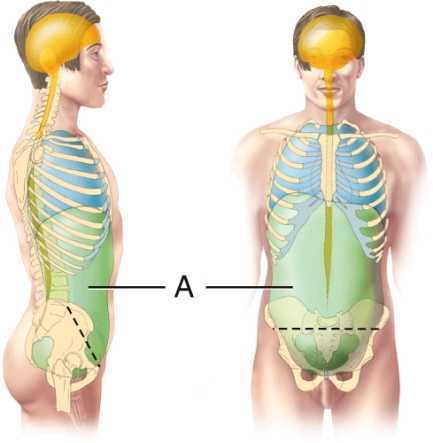


Unlock Deck
Unlock for access to all 54 flashcards in this deck.
Unlock Deck
k this deck
50
Bone cells communicate through small channels called ____________.

Unlock Deck
Unlock for access to all 54 flashcards in this deck.
Unlock Deck
k this deck
51
The abdominal cavity is lined with a membrane called the ______________.

Unlock Deck
Unlock for access to all 54 flashcards in this deck.
Unlock Deck
k this deck
52
Blood is an example of _____________ tissue.

Unlock Deck
Unlock for access to all 54 flashcards in this deck.
Unlock Deck
k this deck
53
What is the function of the neuroglia cells?

Unlock Deck
Unlock for access to all 54 flashcards in this deck.
Unlock Deck
k this deck
54
Illustrate and label the cell shape(s) and arrangement(s) of all epithelial tissue types.

Unlock Deck
Unlock for access to all 54 flashcards in this deck.
Unlock Deck
k this deck


